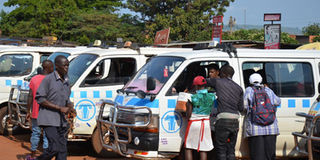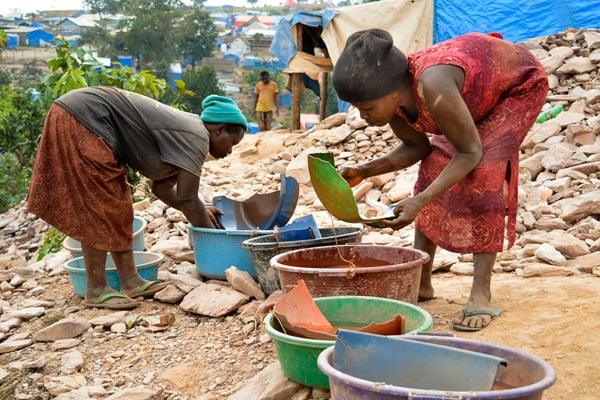Prime
Council unveils Shs7b plan to redevelop Jinja Taxi Park

To be reconstructed. Traders sell products to passengers at the Jinja Taxi Park. The facility currently holds a total of 800 taxis. Photo by Tausi Nakato.
What you need to know:
- The new policy comes after drivers complained to President Museveni about multiplicity of charges by local governments, persistent disputes, conflicts and public outcry and allowing of private individuals and other entities to collect and have custody of the monies.
Jinja Municipal Council has approved a Shs7b plan to re-develop the taxi park, two weeks before attaining city status .
The redevelopment will be done by Jinja Municipal Council in collaboration with sitting tenants, who include the Jinja Taxi Park Operators Association (JITOA), Kiosk Owners and Operators’ Association and Awaken Busoga Development Initiative (a platform for the business community).
Currently, the taxi park is in a sorry state with poor lighting system, no waiting sheds for passengers and with old wooden kiosks, among others.
“We have acquired the land title in the names of Jinja Municipal Council and have now resolved to work with the sitting tenants to redevelop the park at Shs7b because it is in sorry state. Upon completion, it will change the face of Jinja City,’’ the municipality speaker, Mr Moses Morison Bizitu, said on Saturday.
The chairperson of JITOA, Mr Khalid Muyingo, said the redevelopment of the taxi park would reduce congestion in the new city.
“Currently, taxis are parking on every street which has created congestion in town. The redevelopment will attract drivers back to the taxi park because it will be attractive both during day and night,’’ he said.
“It will benefit passengers, drivers, conductors, food vendors and small business owners. We also propose to have a washing bay and modern garage within the taxi park,’’ he added.
According to the chairperson Awaken Busoga Development Initiative, Mr Simon Zabwe, the redevelopment will create room for more businesses to set up in the park.
“The park is currently full of wooden structures, but in the redevelopment plan, they will be turned into modern permanent structures, beautiful and economised space and with proper ambiance that reveals the image of the proposed city,’’ he said.
Mr Zabwe further explained that the proposed development will consist of a magnificent structure which will consist of three floors.
“The ring around the park will have a three storey building. The first two floors will accommodate shops for the current vendors who are operating in kiosks and the top floor will have offices, banking area, lodging facilities, restaurants, security cameras and other social recreation facilities,” he said.
The mayor of Jinja Municipality, Mr Majidu Batambuze, said it is time to stop depending on foreign funding because indigenous people can also contribute in redeveloping such projects.
“Redeveloping the taxi park is one of the projects we are undertaking to rebrand Jinja ahead of city status; we are also rehabilitating different roads, city abattoirs and lighting up streets, among other amenities,’’ he said.
The Jinja deputy town clerk, Mr Peter Mawerere, said the project will increase the council’s resource envelope.
Seven municipalities will attain city status effective July 1, after Parliament approved a motion to create 15 new cities in April.
The cities that will start operation include Arua, Gulu, Jinja, Mbarara, Fort Portal, Masaka and Mbale.
The other cities are Hoima, Lira, Soroti, Entebbe, Moroto, Nakasongola, Kabale and Wakiso.
Kampala will remain the capital city and run by the central government, whereas the new cities created for their strategic location across the regions will be run under local governments.
Fact
Taxi Park.
According to JITOA, 11,200 passengers commute daily through Jinja Taxi Park to different destinations within the Busoga Sub-region and surrounding areas, with 800 taxis operating within the park. It sits on 2.4 acres of land.
In 2017, a total of 120 people operating from Jinja Taxi Park were left jobless following a decision by the central government to have all taxis acquire monthly stickers of Shs80,000 for operation.
This followed the local government revising the policy guidelines on management and levy of parking fees in public vehicle parking areas.
In the new government policy which became effective on July 1, every taxi pays Shs80,000 for a monthly sticker instead of Shs6,000 daily entrance fees to access the park.
The new policy comes after drivers complained to President Museveni about multiplicity of charges by local governments, persistent disputes, conflicts and public outcry and allowing of private individuals and other entities to collect and have custody of the monies.



